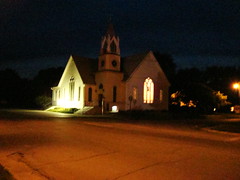I have been neglecting this blog, in part because I've been fighting battles for biblical truth elsewhere. I have been invited to join three other godly men is a deconstruction of a new book by Emergent church leader, Tony Jones.
I don't have the book in my hands at the moment, so the thoughts that follow refer to things that others have written about Chapter 1. In it Mr. Jones is said to compare Christendom to a forest. He is reported to compare failed churches, faulty theologies, and old methods to a materials in a compost heap. Others tell me that Tony Jones likens the Emergent church to a new tree in a forest, feeding from the better parts of the compost heap of Christendom.
That is the gist of Chapter 1 as I understand it. I was inspired to today to consider the Root. So I wrote the following.
I was just reading a blog about the Shepherds Conference 2008. I was praising God for allowing me to see and read about men of faith coming together to uphold Truth. I prayed that God would bless the men who spoke there and those who attended. I prayed that such conferences might not be the formation of, or outworking of a man-made system, but of Christ. Something crystallized in my mind as I was praying. My comments follow from that.
I think we can all agree that churches have much to answer for. But we should not uphold the doctrine of Balaam (Rev 2), which is that God cannot bless that which He has promised to bless. God has not promised to bless everything that we see in going on churches. He has promised to bless the teaching and hearing of His Word.
It is right to question and judge ourselves, as believers and churches, to make sure that we are abiding in biblical truth and spirit. But we should be very careful in saying God cannot bless where His Word is faithfully preached. And yes, preaching is not done just with words. Walking (halikah) in faith is demonstrated to a perishing world through actions.
I must admit that I often wonder how (why) God is going to bless Christendom. But I'm not willing to take my questions and lift them up in order to propose a new system. For me, that is entering into the realm of Balaam. I believe that is one of the first steps on the path to gross apostasy. A departure from God starts in the heart and will proceed outward from there.
A tree often represents a system in the Holy Bible. The fig tree (Mat 21) represents a system that is not bearing fruit for God. Mark (11) paints the picture of Christ not knowing if the tree bears fruit as He approaches it (see Luke 18:8). In Matthew, Jesus is clearly headed to the cross and meeting nearly constant questioning and opposition from the Apostates of that time. I agree with those who interpret the fig tree in Matthew 21 as being a picture of first-century Judaism. It represents a broken-down, fruitless system.
If Tony wants to talk about broken-down fruitless systems, then fine. Christians should do that regularly. However, I do not find his propositions to be consistent with the Holy Bible.
Tony seems to want to make Jesus Christ into the 'Great Ecologist', or something much lower. Does Tony read Psalm 22:6 too literally? Perhaps Tony thinks that Jesus is the 'Great Recycler'. The compost analogy may seem very fitting in all of this talk about trees. But it is wrong, because it ignores the Root! Any system that takes it's sustenance from detritus is not of Christ. Christ is not only the Vine (Jn 15:5), but He is also the Root (Rev 5 & 22.) Does Christ, the Creator and author of Life, draw sustenance from the waste of broken-down systems? Is the Body of Christ nourished by dung?
I've looked at the root of the Emergent church, and I have not found Christ there so far. The Emergent movement emphasizes fruit, but what of the root? They seem to have a lot of leaves. I must give them credit for that.
After actually reading the first chapter, I have a different take on it. The interesting thing is that I can say, with even greater conviction, that the Root of David is not there at all.
